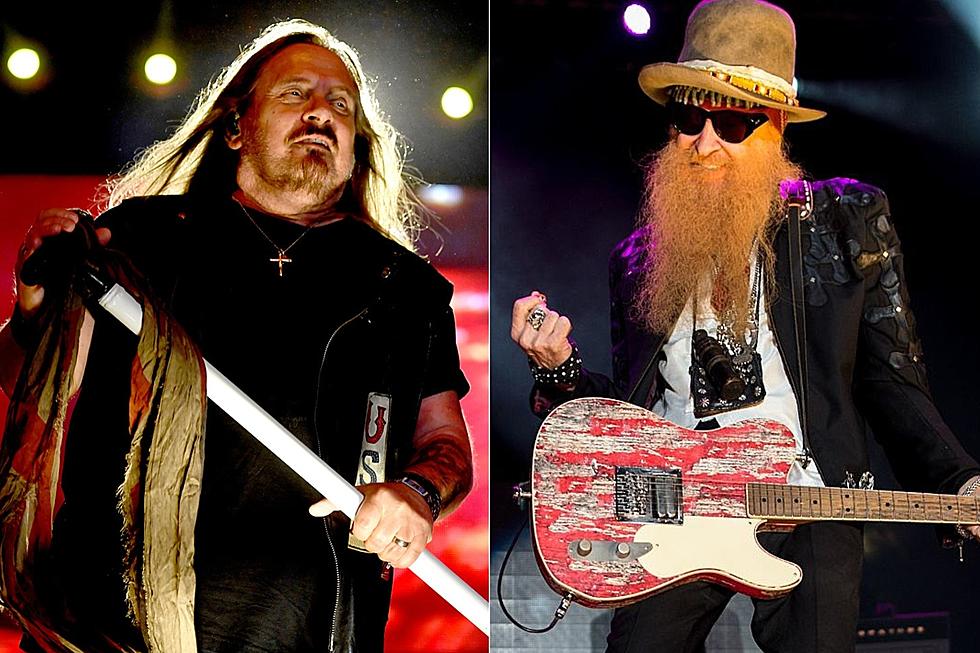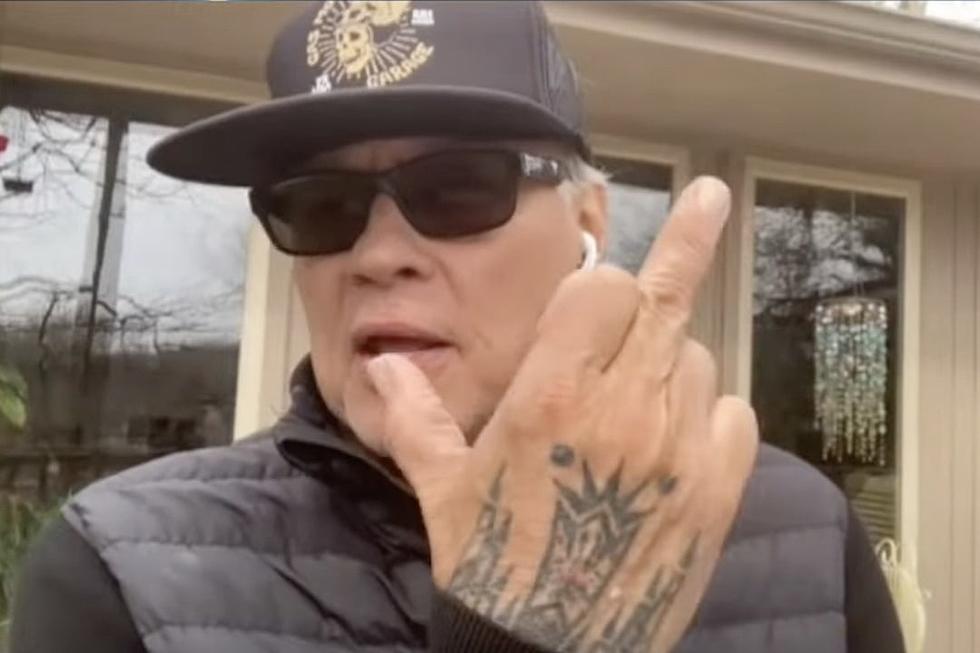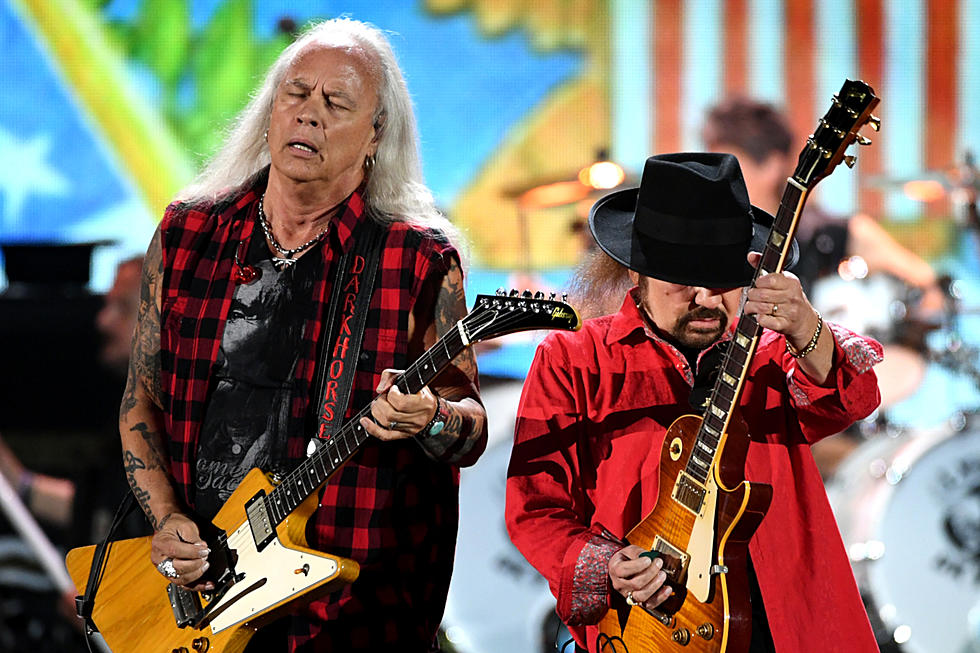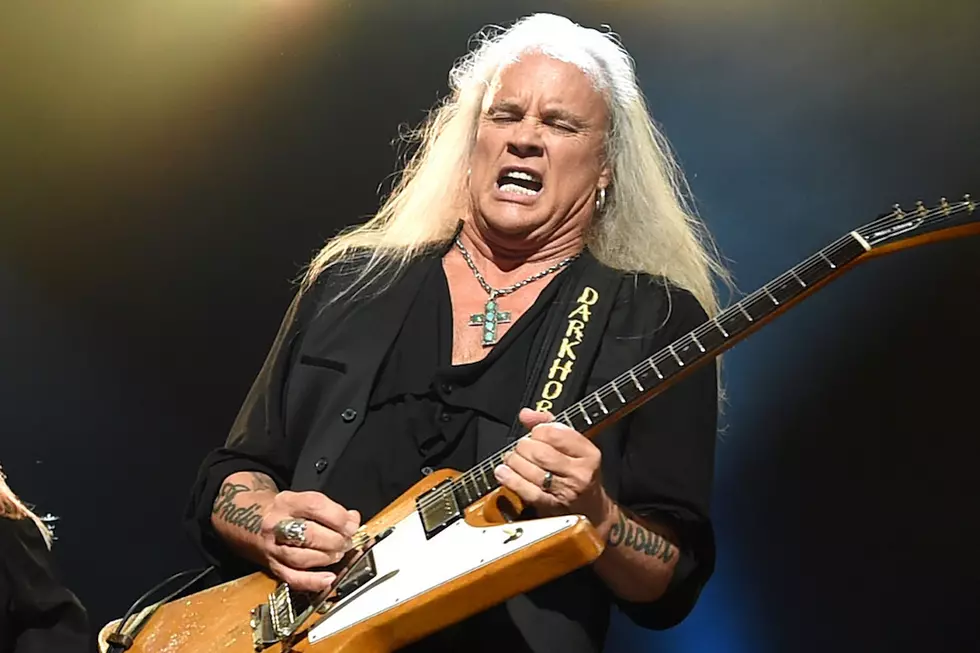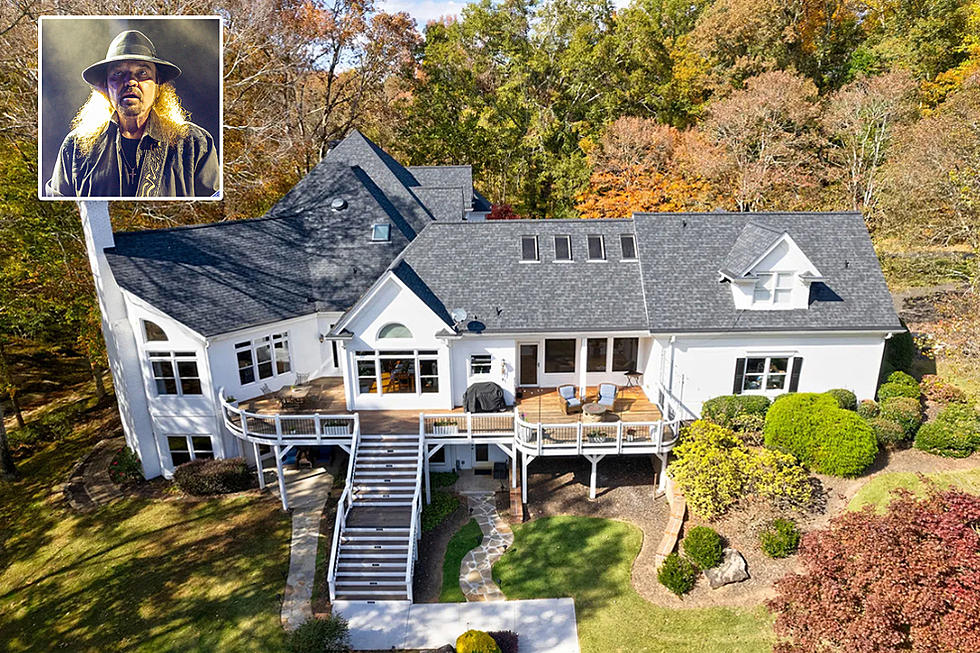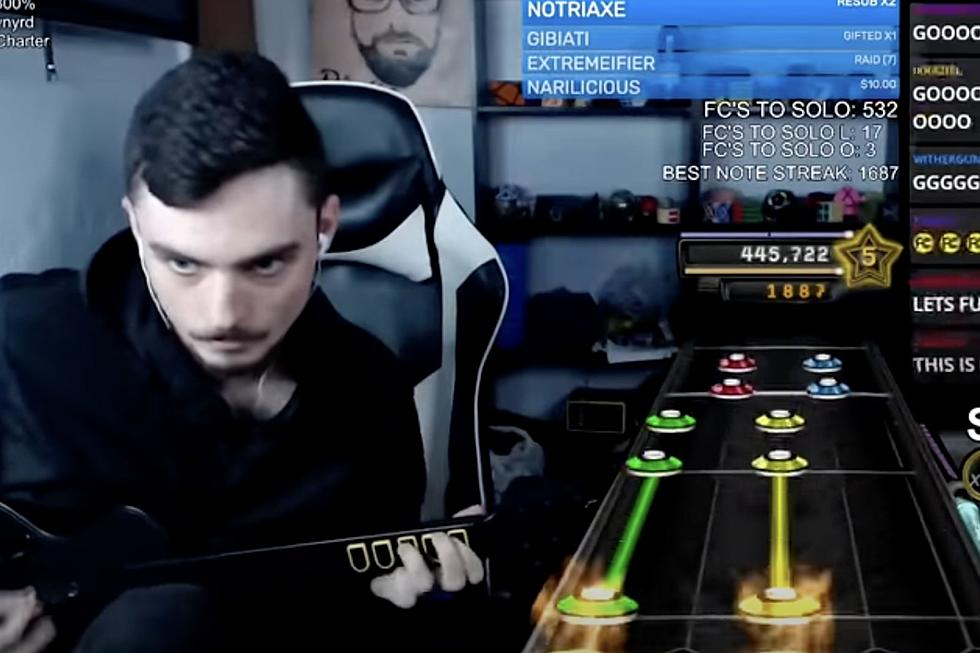Lynyrd Skynyrd’s Johnny Van Zant Discusses New Live Release, Confederate Flag and More: Exclusive Interview
Back in February, the members of the present-day Lynyrd Skynyrd lineup went back to Jacksonville, Fla., where it all began, to revisit the two albums that helped to write the first chapters of their now-legendary story: the 1973 debut, Pronounced ‘Leh-’nerd ‘Skin-’nerd, and Second Helping, the sophomore follow-up which emerged in April 1974, barely eight months after Pronounced had been released.
Things were moving fast for the group back then -- “Free Bird” is now well-known as one of the band’s most legendary songs, but it initially got lost in the shuffle, which is not entirely surprising, since it sits at the very end of the Pronounced album and runs more than nine minutes. The success of “Sweet Home Alabama” from Second Helping brought people back to the debut album with fresh ears and “Free Bird” was finally officially released as a radio single in November 1974, rising into the Top 40 in early 1975 to become the band’s second hit single.
Pronounced Leh-nerd Skin-nerd & Second Helping – Live From Jacksonville at the Florida Theatre features both albums performed in their entirety for the first time by the current lineup earlier this year. Vocalist Johnny Van Zant spoke with Ultimate Classic Rock to talk about the new live release, which will be released on DVD, Blu-ray and digital download on Oct. 23 from Eagle Rock Entertainment and a variety of other topics including new music that the band currently has in the works.
Let’s start at the top and talk about how the idea of doing the full album performances of these albums came about.
You know, years ago we talked about doing this. We were kind of in between records like we are right now, you know, [as far as] studio stuff. At first, we thought about going into a studio situation and doing them acoustically and we were like, “Nah, that ain’t us.” You know, we’ve already done Endangered Species -- we had a record out years ago doing that. So we said, “Let’s go and be in front of an audience.” So then we thought, “Well, shall we do it in an arena or should we go more boutique with a smaller setting?” We never ended up doing it, so of course we’re in between studio albums [again] right now and we said, “You know what? Let’s go do this, but let’s do it in Jacksonville.” That was a big key thing -- we wanted to do it where the band started at. We finally ended up getting a couple of dates [set to do it].
There were a few of these songs that we we’d never done, like “I Need You” and s---, I don’t even know if we did “Don't Ask Me No Questions” before. Some of them, we’d done in a medley and we hadn’t ever done a full version of them. So we had eight shows in nine days up in Canada and what we did, we went to soundcheck everyday and basically just worked ‘em out as our soundcheck. So we said, “Okay, we’re ready” and we had the dates held and actually the date was supposed to be a few weeks earlier, but Gary [Rossington] got sick, so we blew out the date and rescheduled it. The cool thing about it is that we did it in Jacksonville and we did it at the beautiful Florida Theatre there, which is a great theater -- everybody and their brother has played there, from Elvis to….s---, all sorts of people have played there. So it was a pretty cool [place to do it].
It only holds about 1,900 people. I was kind of curious to see what kind of fanbase came out and of course, there was some of ‘em who had probably been there from the get-go at the beginning and then there was younger people. It was just a couple of really good nights and you know, I think it came off. It’s so weird, because you never know how someone else is going to perceive the band -- it’s how they feel the band should look. It’s kind of like us every night. We have a sound guy and a light guy -- they’re the next members of the band, you know, they’re the ones representing us out front. We can do whatever, but if you have a s---ty sound guy, you’re not going to sound very good. If you have a crummy light guy, nobody’s going to see you.
So it was very unique, the way that they filmed it and edited it. My daughter Kristen, was backstage, she does videography and she’s the one that can get in and get stuff on us that usually nobody else would. [Laughs] So there’s bonus stuff in there with that as far as the DVD goes.
You know, we’re looking forward to it, man. We’re starting to write for a new record. We just got together the other day, we were up in Oregon and we had a couple of days at a casino up there and on the second day, me, Gary and Rickey [Medlocke] got together. Gary is the master of keeping things. Over the years since I’ve been with the band, we’ve written tons of songs and Gary had these cassettes and we had to go buy a cassette player. [Laughs]
We end up finding about 11 songs that we really got excited about, so it kind of put the boot in our ass to go, “Okay, let’s go ahead on and get in the studio." So I think we’re going to try to maybe record a couple of them. You know, we want to do it in parts, go in and do a couple of songs and look at it and then go, “Okay, let’s go record a couple of more.” I think that’s the way we need to do it. You know, it’s so hard to go, “Okay, we’re going to set this time aside and we’re going to live in the studio.” And we’re very…..I don’t know what the hell it is, but you know, the cool thing about playing live is, man, you’re in a town and you play that gig and you’re excited about it. You go ahead on [after that] and there’s another place to take on the next night.
Sometimes when you’re in the studio, you get, I don’t know, I don’t want to say bored, but you get in that studio mode where you’re like, “Okay, we’ve gotta go in the studio and do something.” This time, when we’re in that studio, we really want to be going, “Okay, we’re gung-ho, we want to go for it.” So we’re looking forward to the future, man.
Do you have any idea what time period those cassettes are from?
Oh God, since ‘87. So we went back and just looked and you know, he had some CDs. Gary’s the master of keeping this s---. I’m like, “Man, I don’t have any of that.” [Laughs] And Gary’s like, “I do, Bubba!” And I’m like, “Where do you keep all of those at?” Gary’s probably one guy that I would think would not have done that over the years, but he does. He keeps all of that s---. He’s got his s--- together on that. And me and Rickey are like, “Oh my God, I don’t even remember that song!” It’s a long period of time back, but we went back and just listened and we were like, “Man, there’s some really good songs."
Is that normal for you guys to look back like that?
Yes and no. You know, on God & Guns, Gary came in with a cassette and it was [from] when Hughie [Thomasson] was in the band and he said, “Man, I found this tape” and you can hear us on there, we were all laughing our ass off, because Hughie’s amp was [making noise] right before we started to lay this thing down on this cassette, you know, push the record button. It’s a song called “Still Unbroken” and we were like, “What a great song!” It was only half of it, so we ended up finishing it in the studio. I think if a lot of bands tell you the truth, hell, they probably go back and look at what the hell they’ve written. Some of them, you know, “Oh, the producer didn’t like it” or we had something that was like it already on the album, so that was the reason why maybe you didn’t cut it. So it was really cool to go back and listen to stuff.
It’s probably surprising for you guys when you go back and look at stuff and see something that’s just a killer song that got left off the record that maybe it wasn’t the producer or whatever the case is, that you can’t find a reason why it would have been left off.
Yeah, yeah. Well you know, man, s---. Skynyrd goes back a long time ago. Hell, they’ve done that even when Ronnie was in the band. They went back to “One More Time,” a song on Street Survivors -- they put that on the record and it wasn’t on the First and…Last record -- and it was already recorded, so they went back and just touched it up some and put it on the record. It’s kind of put a boot in our booty, because we’ve been touring all year, you know, so at this time of year, you start [heading towards the time when] you’re making a turkey and Christmas and everything and being at home, but we’re like, “Hey, we need to try to start cutting a few things.” I think [that with] some of this time [as] we’re winding down our year, it’s going to be nice to go in the studio and do a few things.
Are you guys going to work with Bob Marlette again? It almost sounds like you’re going to go kind of independent and rogue on this one.
You know, man, I think this one, we’re going to go independent. We love working with Bob -- Bob’s a great friend of ours and he did a fantastic job on the two records that we did with him, especially God & Guns -- that’s probably one of my favorite Skynyrd albums that I’ve done with the band.
I think the Last of a Dyin’ Breed album, we got caught up in that, “Okay, we’re in the studio, we need to get it done.” I don’t want to be underneath that pressure. You know what, as a kid, starting music, I think that anybody that does it for a living, you go, “Oh man, I love playing the music.” You don’t think of being underneath the gun to try to make something. Most band’s first records are their best records, you know, because they weren’t underneath the gun -- they were just writing songs as a band. Eventually, you have a record company going, “We’ve gotta get the next one out!”
So for me, especially at my age and everything else, I want to have fun doing this s---. [Laughs] I don’t want it to be a job anymore! I don’t think any of us do. You know, we want to go back and find the love of music and I think a lot of artists lose that, you know, because it does become a job. Some of my best vibes [come as a result of] talking to my musician friends who play for fun. There’s something about that, you know, because they’re not doing it because they’re getting paid any money, they’re doing it because they’re friggin’ doing it for the love of music. And believe me, I’m guilty of that too, you know what I mean?
You start out and then all of a sudden, you’ve gotta make a living doing this and that’s a scary thing as a musician, you know, you’re like, “What?” [Laughs] So for us, I think we just want to go back in and cut a few things and have fun doing it and let God lead us where we’re supposed to go.
You mentioned the First...and Last album and I think it’s interesting looking at the complete Muscle Shoals sessions for that record. It’s a pretty incredible base of material that the band already had in their arsenal. “Gimme Three Steps,” “I Ain’t the One,” “Simple Man,” “Free Bird,” even before they got into the studio for the Pronounced album, it was a potent time for the group. They were writing a lot of strong stuff.
Sure, sure. You know what, man? I bet you there was other songs back then that just never got recorded. The one thing that I look back on Skynyrd, you know, you see stuff on [Led] Zeppelin and they were very video-wise and recording-wise in their early days, and the Beatles, you know, of course they had it all going for them. I wish that Skynyrd, that somebody in their management team back then, would have been more vigilant to record more stuff and document more stuff. Because I’m sure there’s stuff out there that was written that never will get to see the light of day here.
When you look at the Pronounced record and the Second Helping record, I wondered how you look back on those two records as far as what they mean in the history timeline of this band.
For me, okay, I’m looking at it from a fan’s point and as a brother. It was such a great thrill to see, because you know, Skynyrd used to rehearse in my parents’ living room and then they finally got the Hell House, because I don’t think we could take it anymore at our house. [Laughs] But as far as a fan goes...and again, I always say, you know, people call what we do right now a tribute band -- yeah, we are a tribute band. We always pay tribute to what the old Lynyrd Skynyrd has done -- I’m very proud of that. And I’ll always be paying tribute to my brother, so you can call it whatever you want to call it.
But for me, personally, man, I go, “Hey, you know what? We’re a band, but yeah, we’re paying tribute to it, every night.” Yeah, sure we are. I mean, we’re playing the songs that made this band great and I wouldn’t be in this band if it wasn’t for that. But getting back to the first two records, hell, I remember the first time I heard “Free Bird.” I think what’s missing right now on the radio is that in my era, they used to friggin’ take, I think it was every Saturday night, FM radio would premiere a new record that came out that week and I remember hearing the full-length album on the radio and I was like, "Holy s---, this is the coolest thing ever!" To see it come to fruition [was so great] and plus it was on a major label -- it was MCA’s Sounds of the South and they had worked so hard to get to that point.
Not every song of Lynyrd Skynyrd’s was a single, but songs like "Tuesday’s Gone" and "The Ballad of Curtis Loew" and "Made in the Shade," "I Need You," people learned those songs from the radio, because radio played albums, not just singles. I think that’s really missing in the radio world out there these days, you know, it really is. The first time I heard "Sweet Home Alabama" on the radio, it was like, "Holy s---! Man, I think they’ve got something here!" [Laughs] I was very proud of them, proud for my brother, proud for the band and you know, when you think back about Lynyrd Skynyrd, I don’t know, when it’s all said and done, I think from now, looking back to the very beginning, you know, we’ve always tried to stay honest and always tried to write about things that we knew and things that we went through or other people had been through.
And the band’s rise to the occasion over and over and over, through tragedy and through triumphs, you know, I think looking back on it, probably my one regret would be that the original guys are not here. I wish they were. I always say, you know, if Ronnie was alive, I’d like to be the guy, like, me and my brother once went to see B.B. King and I’ll never forget the old black lady next to me, she punched me and she goes, "Boys," and I said, “Yes, ma'am?” She said, "You guys are the middle of the Oreo cookie at this show!” [Laughs] I went, “Huh?” And then I looked around and I went, we are the only two white guys here! [Laughs] And guess where it was at? It was at the Florida Theatre! It was the coolest show -- he had Bobby "Blue" Bland there and of course, B.B. King, it was seeing freakin’ legends. Bobby "Blue" Bland was a legend and B.B. King, of course. The legend of all legends.
But he had a guy who walked out with a towel and a glass of water and B.B. would be in between songs and the guy would come out and B.B. would wipe his brow with the towel and then the guy would hand him a glass of water. I always thought, well hell, I would have done that for Ronnie! [Laughs] But I know he’s here in spirit -- I’ve always believed that, or else I wouldn’t be here today. I really wouldn’t. I love singing the songs and when we had the opportunity to jump on doing this, I thought there was only one place to do it and that was the Florida Theatre in Jacksonville, Florida. It was a couple of great nights.
How do you think the band had changed by the time they got to making the Second Helping album?
I think they were probably more studio savvy. You know, they had worked with Al Kooper.
He seems like he was a key addition.
Yeah, you know, I think he reeled them in. But I can tell you this, they also kicked his ass out to record “Simple Man.” [Laughs] You know, they had their ups and downs. But I think he gave them their big break with Sounds of the South. I think they all looked up to Kooper and they wanted to do a good job and make the best record that they could. Thank God Neil Young put down Alabama and they wrote a song called “Sweet Home Alabama.” [Laughs] Because it’s still here today and it will be around a lot longer!
Lynyrd Skynyrd has been back in the the headlines over the summer with the whole controversy about the Confederate flag. Where are you guys at with that whole thing?
You know, Gary said on CNN, “Oh, well, we’re not going to use it anymore. We don’t want to offend nobody.” Surely, we don’t want to offend nobody, hey, man. But it is part of our history. I mean, we’re from the South. Yes the flag has been associated with bad things and yes, that guy that shot those poor folks in Charleston, you know, there’s something wrong with the guy -- he’s mentally ill.
Unfortunately, he had a rebel flag [that some people associate with] racism and that made him a racist. But you know, my heart goes out to the families there and everything, but you can’t erase history. I don’t think you can erase history. But we’re not here to offend nobody, I mean, hey, I just mentioned B.B. King. My favorite singers in the world have been black singers and you can go to any church and hear the best singers in the world -- and I’m a singer and I love singing!
This band, I don’t know if you’ve heard of Keb ‘Mo, but man, we love him and his music. So we’re about as un-racist as can be and because we’ve used the rebel flag for “Sweet Home Alabama,” because it was a symbol of Alabama and that’s what we’ve used it for. A lot of people look at us as being racist, but I can tell you that from us, we’re not and surely, you know, we don’t want to offend any of our fans that love the flag too. So we’re on a tightrope here. We’re not saying that we would never use it again -- I don’t know, but for right now, we kind of put it on the back shelf to not offend people. But I think, you know, you can’t erase history.
See Lynyrd Skynyrd and Other Rockers in the Top 100 Albums of the '70s
You Think You Know Lynyrd Skynyrd?
More From Ultimate Classic Rock
